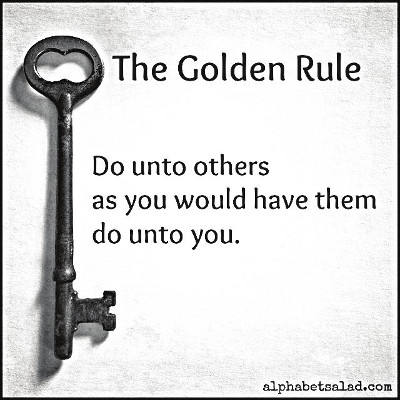
The golden rule isn’t as simple as it first appears. What you may wish for another person to do for you is often not the same as their needs. There are many forms of this teaching in various religions, cultures, and eras that incorporate values of compassion, doing no harm, and being respectful.
Here’s an old biblical instruction relevant to our age: “The stranger who resides with you shall be to you as one of your citizens; you shall love him as yourself, for you were strangers in the land of Egypt.” That’s Leviticus (Old Testament.) Then it is proclaimed as a god-given command with “I the Lord am your God”. Jesus of Nazareth gave us a slightly different version, as well.
The Yoruba people of Nigeria and Benin have a proverb that aims to reduce suffering, increase experiential knowledge, and create compassion: “One who is going to take a pointed stick to pinch a baby bird should first try it on himself to feel how it hurts.”
Siddartha Buddha is attributed to have said that a follower must “Hurt not others in ways that you yourself would find hurtful.” Buddhism is a spiritual path which aims to reduce suffering through dialectic practice, and behaving in “right ways” is emphasized.
A biological term for this pattern of behavior is reciprocal altruism. Do unto others as they would be done by, for you would want them to do as you would want. It is expected that both compromise in the short term but benefit in the long term.
We often see ourselves as being on one side of a war when it comes to our values and beliefs. The division of viewpoints is stark on social media platforms where discussion threads are popular. But these types of polarized interactions regarding economics, politics, government, resource use, social behavior, religion, etc., are not only unproductive—they are counterproductive. How is it possible to grow in our ability to create change by interacting
with someone we believe is a threat to us, or our loved ones, or our values? I believe the answer lies in the practice of empathy.
In Think Humanism, Maria MacLachlan says that “Trying to live according to the Golden Rule means trying to empathise with other people, including those who may be very different from us. Empathy is at the root of kindness, compassion, understanding and respect—qualities that we all appreciate being shown… And although it isn’t possible to know what it really feels like to be a different person or live in different circumstances and have different life experiences, it isn’t difficult for most of us to imagine what would cause us suffering and to try to avoid causing suffering to others. For this reason many people find the Golden Rule’s corollary—”do not treat people in a way you would not wish to be treated yourself “—more pragmatic.
Empathy is not easy, and not everyone comes by it naturally. Even if you are an empathic person, it takes practice to strengthen and use empathy to help others. A strong practice of empathy includes productive communication, creating positive experiences in a painful or uncomfortable situation, ability to tolerate interpersonal distress, self-improvement, and loving ties to other, different, human beings.
A few steps to improve empathy skills for
conflict situations:
1. A short period of daily meditation to focus on breathing, allowing the opportunity for your expectations, beliefs, needs, etc., to fall away from your true nature. This will help you be less reactive in high-stress interactions, especially when conflict resolution skills are needed. 2. Practice listening without interrupting. This is easier with people whose views do not go against the core of your values, so start there. Work your way up to listening to those who incite strong painful emotions as a reaction.
3. Ask questions to encourage the person whom you disagree with to think critically and so you can better understand their values, needs, and fears. Be compassionate; engage with love. Do not fight against the person—the struggle is for what is right.
4. Reflect on your interaction when you have a disagreement with an “enemy.” Shouting matches and personal attacks often cause the other party to hold their ideological stance even more firmly than before. Conflict resolution techniques can bring about productive experiences that encourage positive growth.
To have the power of empathy is a privilege, and compassion is a gift you can give. By sharing this power with those who are “against you,” you have another opportunity to create change for good.
Hilary-Anne is a member of NOON and the PNL editorial committee. She is resident staff at Zen Center of Syracuse Hoen-ji, volunteers at Kindred Kingdoms Wildlife Rehab, and helps animals in need during her free time.





